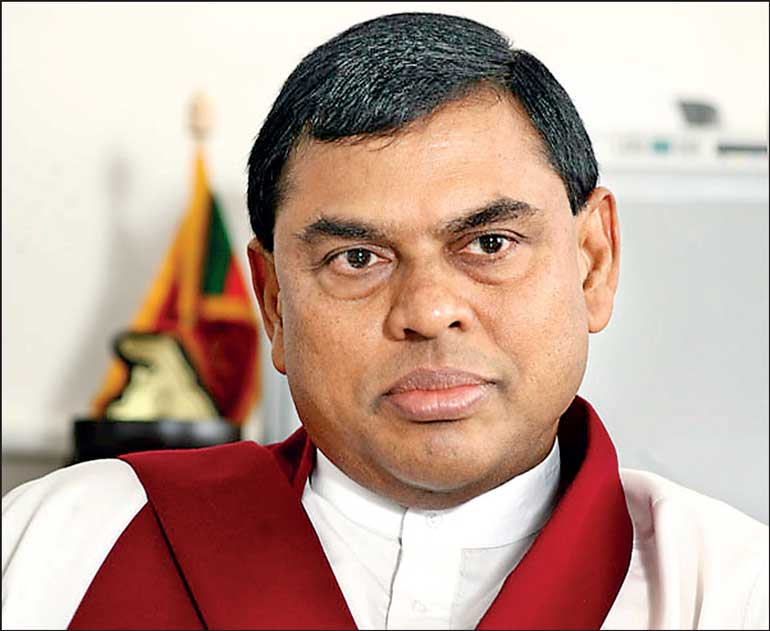Monday Feb 16, 2026
Monday Feb 16, 2026
Friday, 2 July 2021 00:05 - - {{hitsCtrl.values.hits}}

If the Government is keen on appointing Basil Rajapaksa as a National List Member, it will necessitate a Constitutional Amendment; otherwise, the Government will be compelled to act in complete disregard of the law
 The lack of adherence to the law can be considered as an inherent and prominent characteristic of our society and the rulers.
The lack of adherence to the law can be considered as an inherent and prominent characteristic of our society and the rulers.
In Sri Lanka it is typical that many important things take place contrary to the law, and outside the constitutional framework. In this context, Sri Lanka can be considered as a country which has lost civility in politics and respect for the rule of law.
Our inability to conduct ourselves towards a law-abiding nation which respects the Constitution, the supreme law of the country, can be considered as the prime cause of deterioration, failure and the prevailing crisis facing the nation.
Disregard of the law is not an occasional issue; it is a perennial occurrence. The proposed entry of Basil Rajapaksa into Parliament as a National List MP can be considered as the latest issue of constitutionality due to be raised.
Nagananda Kodithuwakku, a political activist, has already inquired from Nimal Punchihewa, the Chairman of the Election Commission about this, and it can be said that the matter is likely to emerge as a serious legal contention.
Basil’s issue
The Editor of the Island newspaper has inquired from the Chairman of the Election Commission about the widespread speculation of Ranjith Bandara’s resignation to accommodate Basil Rajapaksa to enter into the Parliament as a National List MP, and the Chairman of the Election Commission has expressed that there is no legal obstacle for such replacement.
In the meantime Nagananda Kodithuwakku, quoting Article 99 (a) of the Constitution, has pointed out that only a person whose name was included in the National List for the 2020 Parliamentary Elections or one who has contested the election in any other way could be elected to Parliament from the National List. Under the circumstances, appointing Basil Rajapaksa into Parliament from the National List is contrary to the law, as he does not fall into either of these two categories.
According to an interpretation made by the Supreme Court on a similar issue in respect of the case SC 26/27/2002: Paikiasothy Saravanamuttu and Rohan Edirisinha Vs Dayananda Dissanayake and Samaraweera Weerawanni, it would not be possible for a person whose name was not included in the National List or who has not contested the election to be elected to Parliament from the National List. This landmark Supreme Court judgment was delivered by a panel of three judges consisting of Justices Mark Fernando, D.P.S. Gunasekara and C.V. Wigneswaran.
It was a case filed before the Supreme Court, seeking an interpretation of Article 65 of the Provincial Councils Ordinance, in connection with the appointment of Samaraweera Weerawanni, former Chief Minister of the Uva Province, a non-candidate, someone not necessarily subjected to the scrutiny of the voters of the Province and was parachuted into the Uva Provincial Council ahead of other candidates who have received preferential votes from the voters of the Province.
The interpretation made therein equally applies to Parliament as well. The petitioners maintained that the Article 65 of the Provincial Councils Ordinance has granted the Party Secretary the authority to use his discretionary power in filling a vacancy when it occurs, and in such cases the party secretary could appoint any person of his choice to that post, which they indicated was an obscure and ambiguous method which is not consistent with democratic values and contrary to basic principles of representative democracy, and therefore requested the Supreme Court to provide a clear interpretation in keeping with Article 25 of the International Covenant of Civil and Political Rights which recognises that every citizen shall have the right and the opportunity to take part in the conduct of public affairs, directly or through freely chosen representatives, and clear the ambiguity of the Article 65.
The Court accepted the petitioners’ request and decided that when a vacancy occurs in the National List, the Party Secretary should fill it only by a person whose name was on the National List or by one who had already contested the election but had not been elected.
If the Government is keen on appointing Basil Rajapaksa as a National List Member, it will necessitate a Constitutional Amendment; otherwise, the Government will be compelled to act in complete disregard of the law. In such an eventuality, a critical situation will arise, in which both the judiciary and the Election Commission will be subjected to an acid test.
The Government and legal responsibilities
A modern government is compelled to work in accordance with international covenants it has entered into, in addition to acting within the local constitutional framework. First of all, we must act in accordance with the Constitution of the country. At the same time, we must abide by the covenants reached at international level.
The Government is constantly being monitored internationally to ensure whether it is acting in accordance with the country’s Constitution as well as the standards specified in international agreements which it has entered into. In this process, there is a system in operation which rewards the country with special privileges when it performs well and good, and also incurs punishments when its performances are not up to the desired levels.
The EU Parliamentary resolution submitted on 10 June to consider whether the GSP+ concessions to Sri Lanka should be continued or not was passed by a large majority. The 705-member EU parliament adopted the resolution with 628 votes in favour, 15 against and 40 abstaining from voting.
The current human rights violations in Sri Lanka, the misuse of the Prevention of Terrorism Act (PTA), deterioration of democratic environment, “arbitrary” detention of persons such as Shani Abeysekera, a leading criminal investigator, Ahnaf Jazeem, young Muslim poet, and Hejaaz Hizbullah, a prominent lawyer, have come under strong protest from the European Parliament. The protest of the European Union is just and reasonable, and it can be considered as a policy that has been put into action for the benefit of the people of this country.
The benefits Sri Lanka has reaped from the GSP+ concession have been immense. As a result, 66% of goods exported to EU countries enjoy duty free concessions. It is a great relief that we have received and Sri Lanka should not lose it. The only way to protect the GSP+ from the EU is to move the country to a point where the rights of all citizens, including minorities, are protected and honoured.
International responsibilities
All civilised nations are bound to uphold human rights. The fundamental rights which are essential to ensure the decent and wholesome existence and dignity of human beings are considered as Human rights. The United Nations is the main body of international governance with a membership of 193 countries.
Of the countries in the world, only the Vatican City State and Palestine have not received membership in the United Nations, and they remain as observers only. Among the member states are 172 countries that have signed the International Covenant on Civil and Political Rights (ICCPR) and its Protocol.Sri Lanka signed the International Covenant on March 23, 1980 and ratified its Optional Protocol on 3 October 1997.
Accordingly, the UN Human Rights Council has the authority to inquire into the human rights situation in Sri Lanka; and Sri Lankan citizens too, enjoy the right to appeal to the Geneva Human Rights Commission against the decisions of the Highest Court of Sri Lanka in the event when justice is not meted out in human rights violations. I was the first citizen of Sri Lanka to exercise this right effectively.
Sarath Nanda Silva, Chief Justice, realising that the precedence I had created was a major challenge for him, based on the Nallaratnam Singharasa case, delivered an unlawful judgment ruling out that Sri Lanka was not bound to accept the decisions of the UNHRC against the Sri Lankan Government. It was consequent to that illegal Court decision that a situation arose where Sri Lanka was considered an uncivilised country in the political sense.
This ruling has been severely admonished by the international community posing a severe blow to the international stature of the country. Yet, so far, none of the governments that followed have considered it necessary to rectify the error and remove the stigma.